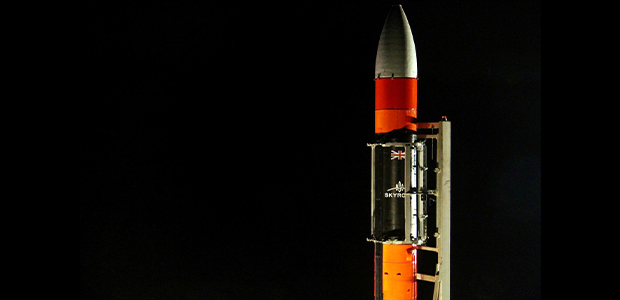
Skyrora secures UK launch licence
Skyrora, the British rocket and space technology company, has been granted a launch operator licence from the UK Civil Aviation Authority (CAA). The licence approval puts Skyrora on course to launch its SkyLark L suborbital vehicle from British soil and, in doing so, will become the first British company to manufacture and launch a rocket into space from the UK.
Being the first and only British company to receive a launch licence, Skyrora has achieved a major milestone in helping the UK with sovereign launch capabilities and gaining access to space without relying on other nations. The licence enables Skyrora to launch from the UK’s licensed spaceport, SaxaVord spaceport in Unst. An MoU was signed between Skyrora and SaxaVord spaceport in 2021 with the goal of achieving up to 16 launches per year by 2030. Skyrora’s Skylark L suborbital vehicle, manufactured entirely in the UK, is operationally ready for launch.
Volodymyr Levykin, CEO of Skyrora, said: “Becoming the first homegrown company in the UK to receive a launch operator licence is a testament to the hard work and dedication of everyone at Skyrora. We are pleased to be able to move forward with our launch plans. Given that operators like us, alongside the CAA, have been forging a new path, the journey to getting our UK licence has been a long but ultimately rewarding one. Safety is paramount to us, and so we are grateful to the CAA for its diligence in ensuring any launch activity is held to the highest of standards.
“It is essential that the UK has sovereign launch capabilities. Not only to unlock commercial activity for companies that need to access space and to help achieve the government’s objectives for becoming a global player in the space sector, but also from a strategic defence consideration. Skyrora is proud to be leading efforts that enable launch activity from the UK and we look forward to achieving a reliable commercial launch programme that benefits us all.”
Rob Bishton, CEO of the UK Civil Aviation Authority, said: “Granting a home-grown company, Skyrora, its launch licence is a major milestone for our space sector and our nation. Our work as the UK’s space regulator is enabling the burgeoning launch industry to safely grow, bringing new jobs and investment with it.”
Scottish Secretary Ian Murray said: "This launch licence isn't just one giant leap for Skyrora – it's a massive boost to the whole of Scotland and the wider UK's space sector. Becoming the first British company to manufacture and send a rocket into space from the UK will be a hugely significant moment. I'm very proud that Scotland is at the forefront of such pioneering technology and I look forward to blast off from SaxaVord Spaceport in Shetland.
"It's an exciting time for the Scottish space sector – an important industry which is playing a vital role in our Plan for Change, helping economic growth and employing thousands of people in good quality jobs across the country. Glasgow, in particular, is a city and region with a huge role to play in the space race, with innovation in this field the focus of its £160 million UK Government-funded Investment Zone status. This zone, established with local partners, is expected to generate around £300 million of initial private investment and support up to 10,000 jobs in the region."
Richard Lochhead, Minister for Business of Scotland, said: “Securing the UK’s first launch operator licence is a landmark moment in Skyrora’s plans to become the first company in the UK to build and launch a rocket into space. It is also a significant milestone and a hugely exciting development for the space sector in Scotland, with Skyrora’s partnership with Saxavord spaceport in Shetland meaning we move a step closer to the prospect of a Scottish-headquartered company launching a rocket into space from a Scottish spaceport.”
Standing 11 metres tall and with a payload mass of 50 kilograms, Skylark L is capable of travelling beyond the Kármán line, a generally accepted boundary marking the transition from Earth’s atmosphere to outer space. The vehicle, produced using 3D printed components in the UK, is powered by a clean-burning 30kN bipropellant engine and is capable of reaching 3.5 times the speed of sound. Its original purpose was to complete final checks on subsystems prior to their use in Skyrora XL. However, completion of the prototype vehicle has created a new market, with its potential for use in microgravity experiments at a lower cost than an orbital vehicle.
For more startup news, check out the other articles on the website, and subscribe to the magazine for free. Listen to The Cereal Entrepreneur podcast for more interviews with entrepreneurs and big-hitters in the startup ecosystem.

